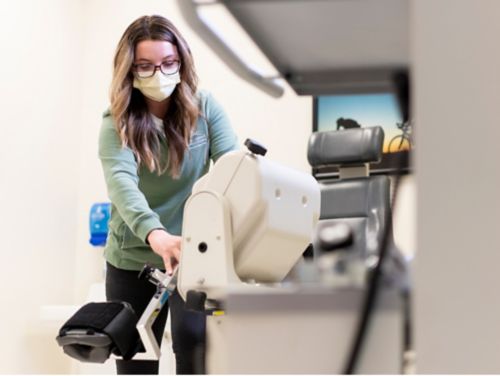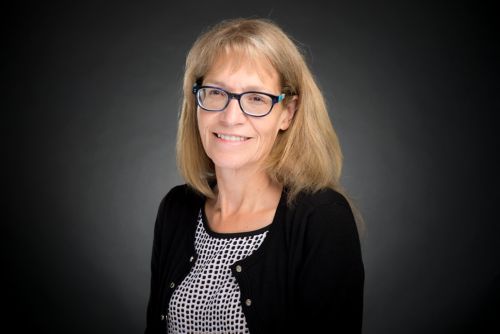St. Jude Family of Websites
Explore our cutting edge research, world-class patient care, career opportunities and more.
St. Jude Children's Research Hospital Home

- Fundraising
St. Jude Family of Websites
Explore our cutting edge research, world-class patient care, career opportunities and more.
St. Jude Children's Research Hospital Home

- Fundraising
Kirsten K. Ness, PT, PhD, FAPTA
Evaluating human movement and performance in children and adolescents during and after treatment for cancer or other catastrophic disease
Overview
The ability to dynamically move the body is a hallmark of an active, healthy life. Yet, for children with cancer, the presence of disease and exposure to treatment affect their abilities to move, play, participate in sports and sometimes even engage in everyday activities. My research team evaluates human movement and performance in children and adolescents during treatment for cancer or other catastrophic disease and in children, adolescents, and adults who have completed cancer therapy. Following patients from diagnosis throughout life, my research aims to better understand physical well-being and develop interventions to remediate or prevent the loss of physical function.

Ness research summary
Evaluating movement and physical well-being in patients and survivors of childhood cancer is central to research in human performance. As part of the Department of Epidemiology and Cancer Control, my colleagues and I conduct a thorough evaluation of an individual’s function and movement in the Human Performance Lab. These evaluations range from small sensory-function measurements in a fingertip to comprehensive measurements of mobility, cardiopulmonary fitness, joint range-of-motion, muscle strength, vascular health, and peripheral nervous system integrity.
Our research within the Human Performance Lab involves children who currently receive treatment for leukemia and lymphoma, brain tumors, other solid tumors, sickle cell disease, and spinal muscular atrophy. We evaluate cancer survivors enrolled in the After Completion of Therapy Clinic (ACT) and St. Jude Lifetime Cohort Study. We are among the world leaders in cardiopulmonary fitness testing in both patients and survivors of pediatric cancer. We also have expertise in the assessment of cardiac autonomic and peripheral vascular dysfunction, isometric and isokinetic muscle strength and balance testing, peripheral nervous system assessment and measurement of normal movement development, and adaptive physical function. In collaboration with diagnostic imaging, we measure muscle and bone quality and quantity. Beyond fitness testing, we study the impact of physical activity, exercise, and diet on long term health in our patient populations.
Our translational approaches to improve physical and overall health in children and survivors include interventions that employ exercise, physical rehabilitation, dietary strategies, mechanical stimulation, telehealth, and interactive mobile technology to restore or prevent loss of cardiac, pulmonary, musculoskeletal, neurologic, and adaptive function. Interventions are individualized and incorporate families. We currently offer an exercise intervention for children receiving radiation therapy, and a telehealth-based cardiac rehabilitation program for cancer survivors who have low fitness. In another effort powered by virtual, remote-based approaches, we partner with the Children’s Oncology Group to promote physical activity in children after they receive cancer therapy.
Our commitment to improving the quality of life for patients and survivors of childhood cancer fuels all aspects of our research and interventional work.
Ness selected publications
About Kirsten K. Ness
Dr. Kirsten Ness is a physical therapist, clinical epidemiologist, and a Member in the Department of Epidemiology and Cancer Control at St. Jude. In her research work, she focuses on recognizing, describing, and remediating functional limitations in childhood cancer survivors. As Principal Investigator of the Human Performance Lab at St. Jude, Ness collaborates with other investigators to understand physiological impairments and problems with movement and physical function in patients and survivors of childhood cancer. She serves on the Executive Committee of the Childhood Cancer Survivor Study and the Children’s Oncology Group Long Term Follow-up Guidelines for Survivors of Childhood and Adolescent Cancer. She is an active member of the Survivorship and Outcomes Committee at the Children’s Oncology Group, and serves on the Editorial Boards of Physical Therapy and the Journal of Cancer Survivorship. Dr. Ness teaches the Introduction to Epidemiology Course in the St. Jude Graduated School of Biomedical Sciences. She also serves on several editorial boards and teaches the Introduction to Epidemiology course within the St. Jude Graduate School. In 2023, her leadership and commitment to the field of public health was recognized with the Gaylord Anderson Leadership Award, presented to an alumnus of the University of Minnesota School of Public Health.

Affiliations and Collaborations
- After Completion of Therapy Clinic
- Center for Experimental Neurotherapeutics
- Chemical Biology and Therapeutics
- Computational Biology
- Developmental Biology & Solid Tumor Program
- Epidemiology and Cancer Control
- Hartwell Center for Biotechnology
- Hematological Malignancies Program
- Hematology
- Human Performance Lab
- Pharmacy and Pharmaceutical Sciences
- Psychology and Biobehavioral Sciences
- Radiation Oncology
- Radiology
- St. Jude LIFE Study
Contact Kirsten K. Ness
Kirsten K. Ness, PT, PhD, FAPTA
Member
Department of Epidemiology and Cancer Control
MS 735
St. Jude Children's Research Hospital
Memphis, TN, 38105-3678 USA

Memphis, TN, 38105-3678 USA GET DIRECTIONS